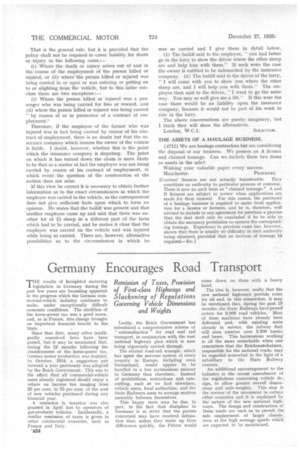Germany Encourages Road Transport
Page 30

If you've noticed an error in this article please click here to report it so we can fix it.
rr HE results of farsighted motoring legislation in Germany during the past few years are becoming apparent in the progress which the German commercial-vehicle industry continues to make, under exceptionally difficult economic conditions. The abolition of the horse-power tax was a good move, and, as in France, this change brought an important financial benefit to the State.
Since that date, many other intelligently conceived laws have been passed, but it may be mentioned that, during the 12. months following the abandonment of the horse-power tax, German motor production was doubled. In October, 1034, a suggestion put forward a year previously was adopted by the Reich Government This was to the effect that all commercial-vehicle users already registered should enjoy a rebate on income tax ranging from 25 per cent. to 75 per cent, of the cost of new vehicles purchased during any financial year.
.4 remission in taxation was also granted in April last to operators of gas-producer vehicles. Incidentally, a similar remission of taxes is given in other continental countries,. such as France and Italy.
'1324
Lastly, the Reich Government has introduced a comprehensive scheme of " rationalization" for road and rail transport, in conjunction with, the vast national highway plan which is now being vigorously carried through.
The eternal road-rail wrangle, which has upset the nervous system of every country in Europe, including even Switzerland, would appear to be handled in a less acrimonious manner in Germany than elsewhere. Instead of prohibitions, restrictions and ratecutting, such as we find elsewhere, vehicle users, local authorities, and the State Railways seem to arrange matters amicably between themselves.
This happy state may be due, in part, to the fact that discipline in Germany is so strict that the parties concerned may have received intimation that, unless they make up their differences quickly, the Fithrer would
come down on them with a heavy hand.
The idea is, however, really that the new national highways provide room for all and, in this connection, it may be mentioned that, during the past 18. months, the State Railways have passed orders for 2,000 road vehicles. Most of these maaines have already been delivered and, with existing Units already in service, the railway fleet will soon number over 2,500 lorries. and buses. This harmonious working is all the more remarkable when one remembers that the Reichsautobahnen, responsible for the national roads, may be regarded somewhat in the light of a subsidiary to the State Railway concern.
An additional encouragement to the industry is the recent amendment of the regulations concerning vehicle de-. sign, to allow greater overall dimensions and axle-weights. This step is the reverse of the movement in certain other countries and it is explained by the nature of the new national highways. The design and construction or these roads are such as to permit the. safe employment of larger cbass.i.s:. even at the high average speeds which are ,expected to be maintained.












































































